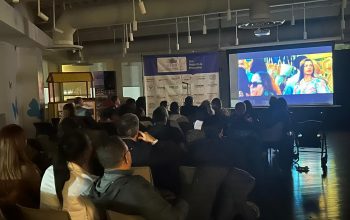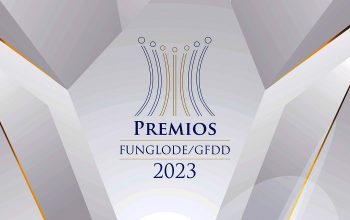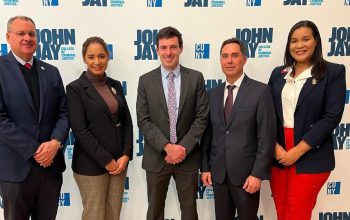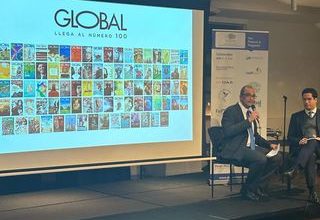news
Steve Clemons Predicts How Political Polarization in the United States Will Impact Upcoming Presidential Elections
August 24, 2012
On Wednesday, August 22, Global Foundation for Democracy and Development (GFDD), and its sister institution in the Dominican Republic, Fundación Global Democracia y Desarrollo (FUNGLODE), organized the discussion forum "Political Polarization in the United States and the Presidential Elections," with US Journalist and Senior Researcher at the New America Foundation, Steve Clemons.
Clemons affirmed that the electoral process in the United States is characterized by a profound division and polarization. He claimed that as result of this division, the election of the next President of the United States will be decided by just a few States.
“The sad reality is that we act as though everyone elects the President; and it isn’t true,” declared Clemons. He revealed that Florida, Virginia, Michigan and Pennsylvania
would decide the elections, and that the other States were either Democrat or Republican.
Clemons identified social networks, blogs and excess transparency as contributing factors to polarization. Transparency, he insist, when excessive, impedes politicians from carrying out negotiations not intended for public disclosure.
“When we speak about political division and its context, we need to acknowledge that it did not start in just the last
few years. This antagonism rather began many years back. The founding fathers did not believe in political parties. They feared political struggles and tried to construct a system in which the Executive, Legislative and Judicial Branches would compete among each other, but not political parties. This is where the political system truly has failed, and to a certain extent, North American politics have been in part a story of antagonism, struggle and polarization,” commented the
Senior Fellow at the New America Foundation.
“Many North Americans see the world in different ways. I’m from Oklahoma, in the Midwest. There are farmers that have little university education – versus cities where there is a higher level of education. The United States is divided and there are structural reasons for this,” he stressed, explaining the division and its impact on the electoral process.
He also referred to the
demographic changes occurring in the country, including the growth of the country’s Hispanic presence, and this group’s influence on the coming elections. He emphasized that the political leverage of this Hispanic population in some States involves redistribution of the district borders that elect members of Congress.
Dr. Leonel Fernández, President of GFDD and FUNGLODE and former President of the Dominican Republic; Vice President Margarita Cedeño de
Fernández; and historian Bernardo Vega were among the high-level audience members in attendance. Lawyer and ex-ambassador Flavio Dario Espinal introduced Clemons and moderated the question and answer session that followed.
In response to Dr. Leonel Fernández’s question regarding the impact of the super political action committees, Clemons remarked that he believed that they have negatively affected elections given the fact that they receive unlimited donations
without sort of supervision.
Regarding the role of traditional media affiliates, the senior journalist asserted that the tendency of large scale media corporations to buy out local media stations impedes citizens from accessing other news alternatives.
Clemon’s talk was followed by analysis and debate surrounding the political reality of the United States and the presidential elections to take place November 6. On this same day, the United
States will elect 33 senators, the House of Representatives, 11 governors and congressional leaders.
About Steve Clemons
Steve Clemons is the founder of the American Strategy Program at the New America Foundation. He is currently a Senior Fellow at New America, of which he previously served as Executive Vice President, and remains actively involved in the direction of the American Strategy Program.
Publisher of the
popular political blog The Washington Note, Mr. Clemons is a long-term policy practitioner and entrepreneur in Washington, D.C. He has served as Executive Vice President of the Economic Strategy Institute, Senior Policy Advisor on Economic and International Affairs to Senator Jeff Bingaman (D-NM) and was the first Executive Director of the Nixon Center. He has also been a part of the Center””s Advisory Committee on United States – Japan relations for the RAND Corporation. Previously, Mr.
Clemons was the Executive Director of the Japan America Society of Southern California (1987-1994).
Prior to moving to Washington, Mr. Clemons served for seven years as Executive Director of the Japan America Society of Southern California, and co-founded with Chalmers Johnson the Japan Policy Research Institute. He is a Member of the Board of the Clarke Center at Dickinson College, a liberal arts college in Carlisle, Pa., as well as an Advisory Board Member of the C.V.
Starr Center for the Study of the American Experience at Washington College in Chestertown, Md. He is also a Board Member of the Global Policy Innovations Program at the Carnegie Council on Ethics and International Affairs and on the advisory board of the Robert Bosch Foundation Alumni Association.
Mr. Clemons writes frequently on matters of foreign policy, defense, and international economic policy. His work has appeared in many of the major leading op-ed pages,
journals, and magazines around the world.
In 1993, Mr. Clemons served as Technical Advisor for the film Rising Sun, starring Sean Connery and Wesley Snipes. Mr. Clemons has also served as the host of news programs and played a role in the film State of Play, starring Ben Affleck.
GFDD and FUNGLODE are proud to present to audiences in the Dominican Republic and elsewhere the opportunity to discuss pressing global issues with informed experts, opinion
makers and other counterparts.
Related links:
asp.newamerica.net
www.thewashingtonnote.com
events.theatlantic.com/





